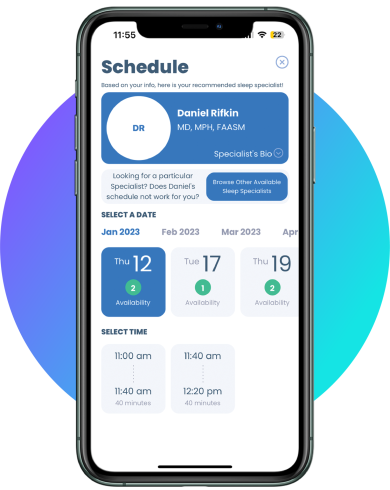Welcome to Ognomy, Cardiogram user!
If you've ever wondered if your high blood pressure or restless nights could be a sign of sleep apnea, you're in the right place. With Ognomy you can have a virtual consultation and a fast, home-based sleep evaluation with a qualified sleep medicine clinician to find out for sure.
To book a virtual consultation, the next step is to create an account and provide some required information such as your insurance details, so we can check your coverage."


Did you know that Obstructive Sleep Apnea (OSA) is an important factor to focus on in the the fight to treat and prevent heart disease, due to the prevalence of secondary health issues which can arise when OSA is left untreated?
By collaborating with Cardiogram, we want to ensure you receive the highest quality of care and support throughout your journey to better sleep, and better heart health.
How Ognomy Works
SIGN UP.
SCHEDULE.
SHOW UP.
Register as a new patient online using your desktop or mobile device
Book a video consultation with a sleep specialist in your state
Take our one-night home sleep test in the comfort of your own bed
Your doctor will start you on a personalized treatment plan
Receive ongoing support throughout your patient journey
Frequently Asked Questions
Sleep apnea is a sleep disorder that affects over 25 million people in America alone and almost a billion people worldwide. It occurs in all sexes and all age groups, and it commonly goes undiagnosed. In fact, more than 80% of patients with sleep apnea don’t even know they have it. Let’s get into the specifics. This disorder shows up, primarily, in two forms: Obstructive Sleep Apnea (OSA) and Central Sleep Apnea (CSA).
Obstructive Sleep Apnea
OSA is by far the more common of the two. It occurs when the muscles in the back of your throat fail to keep your breathing airway open, resulting in either a partial or complete blockage in your airway. Essentially, you stop breathing periodically throughout the night! This, in turn, signals your brain to partially wake up in order to tell your body that you need to breathe, because, you know, you need to breathe to stay alive. This can cause you to wake up as many as 500 times each and every night, depending on the severity of your OSA.
A note on the varying severity of OSA:
- Mild OSA: 5-14 interruptions in breathing per hour.
- Moderate OSA: 15- 30 interruptions per hour.
- Severe OSA: 30 or more interruptions per hour.
These apnea obstructions are often followed by gasping, choking, and snorting sounds, which are the result of trying to take a deep enough breath to fight past the obstruction so that you can breathe. Once a breath is taken, the brain returns to sleep. However, these events might be very subtle and are virtually silent to certain people.
Central Sleep Apnea
Central Sleep Apnea (CSA) is a bit different. It is more of a communication problem with the brain than a mechanical problem with the breathing airways. With CSA, your brain actually fails to signal the muscles that are supposed to be regulating your breathing. CSA is much less common, comprising around 15% of all sleep apnea cases.
- Do you regularly wake up tired or with a headache?
- Do you doze off during the day?
- Do you snore?
- Do you get really warm at night?
- Do you wake up to use the bathroom a lot?
If you have one of more of these symptoms you might have sleep apnea, so you should get it confirmed by a sleep specialist as soon as possible. Only they can diagnose you properly.
Our blog explains even further.
The cost of a home sleep test is less expensive than a traditional sleep study. If paying by insurance, your co-pay will likely be the same, usually less than $25.
You may be responsible for your typical specialist visit via copay, but there are no additional fees. Furthermore, you will never be charged a fee without your consent.
If you have a high-deductible plan or no health insurance at present, Ognomy offers a very reasonable self-pay option that includes an initial sleep specialist consultation, a home sleep test, and follow-up consultation, all for just $299.
Contact us at sheepa@ognomy.com if you would like more information.
We do accept most insurances and will verify coverage after you set up an appointment. You won’t be charged anything until we get confirmation from you. If you don’t have insurance, we do offer self pay options and can discuss those with you after you make your appointment. Again, you can cancel your appointment 24 hours in advance with no charge.
Once you have your virtual consult with the doctor and we determine a sleep test is necessary for you, we will send it to your home. When you receive the test, you will be required to wear it for one night in your own bed and send it back to us the following day in the pre-paid shipping package that will be provided to you.
We’ll review the results of the test and have a follow up virtual visit with you to discuss those results and your treatment options.
With Ognomy, you will have access to a licensed sleep doctor in your state who can provide a diagnosis, discuss your test results and design a treatment plan for you.
I think this is right for me, but I still have questions.
No problem, you can call us at 1-877-664-6669 to speak to our Sheepa (patient service) team or email us at sheepa@ognomy.com with any questions.
Have questions?
Our Sheepa (Sleep Support) team is on hand to answer any questions you may have.
